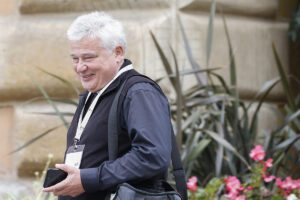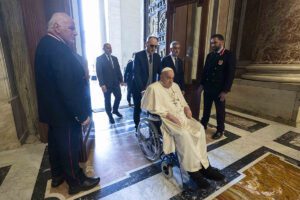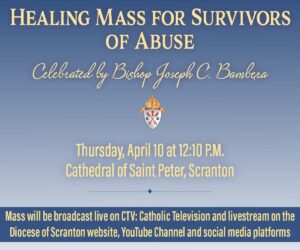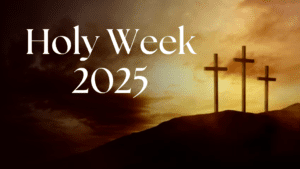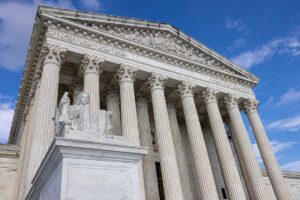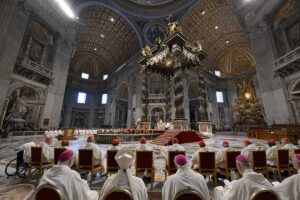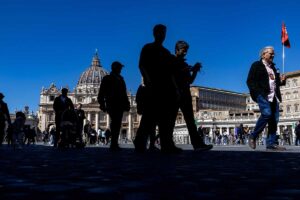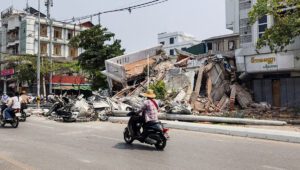WASHINGTON (OSV News) – The U.S. Conference of Catholic Bishops said it would not renew its cooperative agreements with the federal government related to children’s services and refugee support after its longstanding partnerships with the federal government in those areas became “untenable.”
Earlier this year, the Trump administration suspended a federal refugee resettlement program as part of its broader effort to enforce its hardline immigration policies. The ensuing halt in federal funding for the USCCB’s refugee resettlement services is the subject of ongoing litigation, and it prompted the conference to lay off about a third of the staff in its Migration and Refugee Services Office in February.
A spokesperson for the USCCB told OSV News the bishops were seeking reimbursement of $24,336,858.26 for resettlement services (PRM and ORR programs) that was still pending payment as of April 7.

“This situation has been brought to us by the decisions of the government,” Anthony Granado, associate general secretary for policy and advocacy for the USCCB, told OSV News.
Despite decades of partnership with the USCCB’s Migration and Refugee Services, across administrations of both parties, including the first Trump administration, Granado said, “we’ve been placed in an untenable position now.”
“It is clear that the government has decided that it wishes to go about doing this in a different way that doesn’t include us, and so we were kind of forced into this position,” Granado said.
Archbishop Timothy P. Broglio, president of the USCCB and head of the U.S. Archdiocese for the Military Services, said in an April 7 statement it was “heartbreaking” to announce the bishops’ conference would not renew its “existing cooperative agreements with the federal government related to children’s services and refugee support.”
“This difficult decision follows the suspension by the government of our cooperative agreements to resettle refugees,” he said. “The decision to reduce these programs drastically forces us to reconsider the best way to serve the needs of our brothers and sisters seeking safe harbor from violence and persecution. As a national effort, we simply cannot sustain the work on our own at current levels or in current form.”
Citing the government’s suspension of the cooperative agreements to resettle refugees, Archbishop Broglio said that the conference has “been concerned with helping families who are fleeing war, violence, and oppression find safe and secure homes.”
“Over the years, partnerships with the federal government helped expand lifesaving programs, benefiting our sisters and brothers from many parts of the world,” Archbishop Broglio said. “All participants in these programs were welcomed by the U.S. government to come to the United States and underwent rigorous screening before their arrival. These are displaced souls who see in America a place of dreams and hope. Some assisted American efforts abroad at their own risk and more seek a place to worship and pray safely as they know God calls them.”
He said, “Our efforts were acts of pastoral care and charity, generously supported by the people of God when funds received from the government did not cover the full cost.”
Federal law requires that unaccompanied refugee minors be cared for, and the Department of Health and Human Services’ Office of Refugee Resettlement historically has turned to faith-based organizations, including the USCCB, to carry out this work.
A spokesperson for HHS did not immediately respond to a request for comment from OSV News about its cooperative agreement with the USCCB.
Granado said the conference’s cooperative agreements with the federal government were “really about people.”
“From the church’s perspective, this is about responding to the Gospel command — Jesus says in the Gospel, ‘I was a stranger and you welcomed me,'” he said, referencing Jesus Christ’s words in Matthew 25:35-40 regarding his final judgement. “This has been a blessing and a beautiful part of the USCCB and the Catholic Church in the United States.”
The children and refugees impacted “are real people, real families” as well as “the staff whose work will be impacted,” Granado said.
As the agreements end, Archbishop Broglio added, “we will work to identify alternative means of support for the people the federal government has already admitted to these programs. We ask your prayers for the many staff and refugees impacted.”
The USCCB, Archbishop Broglio said, “will continue advocating for policy reforms that provide orderly, secure immigration processes, ensuring the safety of everyone in our communities.”
“We remain steadfast in our commitment to advocating on behalf of men, women, and children suffering the scourge of human trafficking,” he said. “For half a century, we have been willing partners in implementing the government’s refugee resettlement program. The Gospel’s call to do what we can for the least among us remains our guide. We ask you to join us in praying for God’s grace in finding new ways to bring hope where it is most needed.”

